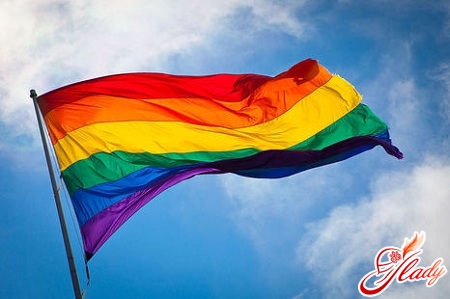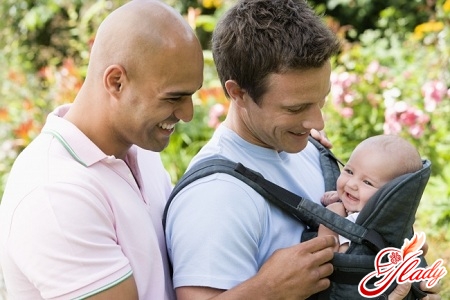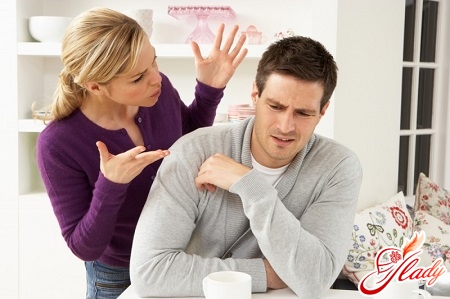 Until the mid-seventies of the last century, anydeviation from the usual norm in sexual relations was considered a mental illness. But in 1975 the American Psychological Association appealed to colleagues from all over the world to remove the brand of mental illness from people who are characterized by unconventional orientation in sex - from lesbians, gays and bisexuals. Psychology deals with the emotional well-being of people, and consequently with what threatens this well-being. American psychologists have proved that prejudice and discrimination towards people who consider themselves lesbian, gay and bisexual, has a negative psychological effect not only for each such person, but for the whole society as a whole. Today, adherents of non-traditional sexual relations are not considered mentally ill people, and the attitude towards them around the world has changed radically. But still the attitude towards them remains completely ambiguous. What makes these people different from everyone else and what is sexual orientation in general?
Until the mid-seventies of the last century, anydeviation from the usual norm in sexual relations was considered a mental illness. But in 1975 the American Psychological Association appealed to colleagues from all over the world to remove the brand of mental illness from people who are characterized by unconventional orientation in sex - from lesbians, gays and bisexuals. Psychology deals with the emotional well-being of people, and consequently with what threatens this well-being. American psychologists have proved that prejudice and discrimination towards people who consider themselves lesbian, gay and bisexual, has a negative psychological effect not only for each such person, but for the whole society as a whole. Today, adherents of non-traditional sexual relations are not considered mentally ill people, and the attitude towards them around the world has changed radically. But still the attitude towards them remains completely ambiguous. What makes these people different from everyone else and what is sexual orientation in general?
What is sexual orientation?
Sexual orientation refers to a strongstructure of emotional, romantic and / or sexual attraction to men, women or to both sexes. She also refers to the sense of a person's identity that features that are associated with behavior and a sense of oneness with people who have the same orientation of orientation. It is known that sexual orientation varies from traditional heterosexual, when there is an emotional, romantic or sexual attraction to the opposite sex, to non-traditional orientation. Unconventional sexual orientation, in turn, is divided into several types: gays or lesbians (attracted to people of their own sex) and bisexuals (attracted to both men and women). This range of behavior has been described in various cultures of peoples around the world. Sexual orientation may differ from other components of gender and gender, including from the biological sex (anatomical, physiological and genetic characteristics associated with the being of a man or woman), gender identity (the psychological basis of being a man or woman) and a social gender role (cultural norms , which define the framework of male and female behavior). Orientation in sex is often perceived as if it were only an indicator of the biological sex of a person and an indicator of his gender identity. But this view is incomplete, because sexual orientation is more a concept from the plane of relationships with other people. A person expresses his sexual orientation precisely in interaction with those to whom his sexuality is directed, and it can manifest itself in very simple actions, for example, when partners kiss each other or simply even hold hands. Thus, sexual orientation is closely related to intimate personal relationships that meet the deep need for love, affection and intimacy. In addition to sexual behavior, personal relationships include not only physical love, but also emotional attachment, common goals and values, mutual support and commitment to each other. Thus, sexual orientation is not only a personal characteristic of one person. Most likely, this or that sexual orientation defines a group of people in which, probably, each member of this group will find satisfaction of their needs in romantic relationships, which are an important component of personal identity for many people. 
How do people find out about their non-traditional orientation?
According to the current resultsstudies, the main indicators that form the basis for adult sexual orientation, usually arise between adolescence and early adolescence. Such models of emotional, romantic and sexual attraction can arise without prior sexual experience. A person can still be a virgin, but at the same time he may already know that he or she has unconventional sexual orientation, whether it be lesbians, gays or bisexuals. The same is true for heterosexuals, by the way. Different people have completely different experiences, related to awareness of their sexual orientation. Some firmly know that they are lesbians, gays or bisexuals long before they actually enter into a similar relationship. Others enter into sexual relations before they become aware of their sexual belonging to one or another orientation. Condemnation of society and unofficial discrimination often makes it difficult for many people to come to the definition of their sexual identity, so a person's awareness of the non-traditional nature of his sexual preferences can become a rather slow process. And what makes a person have a special sexual orientation? What prerequisites can contribute to this? Scientists do not agree on the exact reasons that lead to the development of heterosexual, bisexual, lesbian or gay orientations in a person. And although there are many studies on this topic, to date, experts have not found anything that would lead them to the conclusion that sexual orientation can be determined by some specific factor. Many of them believe that in the formation of orientation a big and complex role is played by nature and upbringing, that's why a person can not choose the sexual orientation at his own discretion - from him it actually does not depend.
What is the psychological impact of discrimination of sexual minorities?
Prejudice and discrimination, whichPractically all over the world people of non-traditional orientation are exposed, have a social and personal plane of influence on these people. The impact on lesbian, gay and bisexual people at the social level is reflected even in the everyday stereotype of the behavior of people in these groups. Such stereotypes persist among people of traditional orientation towards representatives of non-traditional minorities, even if there is no clear evidence of their belonging to gays or lesbians. This is usually a very unfriendly attitude; such people are considerably limited in the possibility of finding a job, raising children and recognizing their right to create married couples. On a personal level, discrimination can also have negative consequences, especially if gays, lesbians or bisexuals try to hide or deny their sexual orientation. Such a psychological burden can have serious negative consequences for health and emotional well-being, becoming a source of constant stress. And if in other cases the support of others can help a person in the fight against stress, then gays, lesbians and bisexuals can hardly expect such support. So can we still consider homosexuality a mental disorder? Experts believe that this is not a mental disorder. Studies have shown that there is no internal connection between any of the sexual orientations and psychopathology. Both heterosexual and homosexual behavior are normal aspects of human sexuality. As we have already mentioned, both forms of sexuality were recorded in different cultures and among different peoples in different historical epochs. In addition, such forms of sexual behavior are not uncommon in the animal kingdom.
Are there any methods of returning to traditional orientation?
Recall: in 1974, for the first time homosexuality was excluded from the list of mental illnesses. It happened in the USA; and in 1990, the example of American psychologists was followed by the World Health Organization, which made appropriate changes to the International Classification of Diseases. And since non-traditional sexual orientation is not a disease, then there is no reason to treat it either. The only thing that psychologists can do for people with non-traditional sexual orientation is to help such persons effectively cope with social discrimination of the society, successfully solve the problems arising in connection with internal conflicts in their circle of communication and actively lead a happy and satisfying life. 
Sexual orientation in adolescence
Adolescence is the period when a childtries to separate himself psychologically from his parents and family and begins to develop his own autonomy. This age can be a period of experimentation, and many young people may be hesitant to determine their sexual orientation. Awareness of sexual feelings is part of the growing up of a young man or a girl. Sometimes teenagers experience same-sex feelings or experiences that confuse them and cause confusion in determining their own sexual orientation. Such confusion eventually clears up, for different young people with different end results. Some adolescents are interested in participating in same-sex relationships, and even conduct some "experiments" in this direction, but do not consider themselves gay or lesbian. And some continue to continue to be attracted only to members of their gender, but do not show any sexual activity or enter into heterosexual relationships for some time. This is due to their fear of those persecutions that can comprehend them in a society where, as a rule, an intolerant attitude to this kind of love reigns. For some young people, the process of studying their attraction to members of their own sex ends up in the fact that they begin to identify themselves as lesbians, gays or bisexuals. For some of them, the recognition of this identity can put an end to confusion with the definition of one's own sexual orientation. If they find understanding and support from their relatives, then their psyche is practically not subjected to stress testing. It must be said that the younger the person who recognizes himself as a person with an unconventional orientation, the less he has internal resources to defend his right to be just that. Thus, young people who early enough realize themselves "not like everyone else" especially need the understanding and support of parents and other close people. Very often they face certain problems and experience negative experiences, for example, beating or intimidating classmates. Such experiences can lead to very negative consequences, such as suicidal thoughts, and such as unprotected sex and the use of alcohol and drugs. That is why it is very important for a teenager to have an opportunity to talk about his intricate feelings with someone to whom he can completely trust, whether it be one of the parents, another member of the family, a close friend or a school psychologist. It is not always easy for a teenager to find someone to talk on an exciting topic. Moreover, he is not entirely sure that the person whom he wants to trust will react calmly and positively. Sometimes parents are really not ready for such a conversation. In this case, psychologists, doctors or consultants can help the teenager cope - confidentially and privately, without informing the rest of his circle - with the difficult feelings that his developing sexuality causes. These experts can help adolescents find ways to cope with any peer pressure and with harassment and bullying that they may face in their later life. They can also help parents manage any complex feelings that they might experience when they learn about the sexual views of their grown-up child.
What is the nature of same-sex relationships?
In the West, often conduct all kinds ofStudies that concern homosexuals. The results of the research show that many of them have exactly the relationships that seem to them most attractive. For example, survey data show that between forty and sixty percent of gay men and between forty-five and eighty percent of lesbians are in romantic relationships with partners who have a similar sexual orientation. And the surveys conducted in the United States in connection with the population census showed that one pair of nine who live together but did not register a marriage consists of partners of the same sex. Stereotypes, which have long existed in relation to lesbians and gays, are alive in our society today. But many of these stereotypes no longer reflect the actual state of things. For example, people think that the relationship between gays and lesbians is inherently dysfunctional and does not bring them happiness. Nevertheless, Western researchers claim that to date, both gay and heterosexual couples are equivalent to each other in the matter of relations and fulfillment of their obligations towards each other. Another stable stereotype is that relations in homosexual couples are unstable. But, despite the social hostility towards same-sex relationships, lesbians and gays create fairly stable pairs. All the same Western studies show that eighteen to almost thirty percent of homosexual couples have lived together for ten or more years. In addition, many gays and lesbians claim that the opportunity to enjoy the same legal rights related to marriage as ordinary couples could further enhance the stability of relations between same-sex partners. The third common misconception of others is that many believe that the goals and values of couples of gays and lesbians are significantly different from the goals and values of heterosexual couples. In fact, factors that affect the satisfaction of partners with their relationships, as well as the purposefulness and stability of these relationships, are surprisingly similar to similar factors in heterosexual couples. But research based on the experience of people who identify themselves as bisexual, was much less. If these people are in same-sex relationships, then they obviously face the same problems that lesbians and gays have. If they are in heterosexual relations, their experience of partnership can be very similar to the experience of people who consider themselves to be convinced heterosexuals. 
Can gays or lesbians be good parents?
Now this issue is of particular concern to societystrong. Unisex marriages in different countries began to be recognized by law, and people who consider themselves spouses want to raise and educate children. The attitude to the issue of the upbringing of children in same-sex families is indeed very acute and ambiguous today. Meanwhile, in the United States, for example, thirty-four percent of lesbian women and twenty-two percent of gay men who share a household with their same-sex partners reported during the census that at least one child is living with them eighteen years old. But there are also lone lesbians and gays who have children, and there are quite a few such parents. The legal status of lesbians and gay men has grown significantly in many countries. But many heterosexually oriented members of society express concern about the well-being of children in same-sex families. Most of these questions are based on a negative, which is surrounded by stereotypes about homosexuals. How can this negative affect their children? Can children, raised by gays and lesbians, be in an ineffective position compared to children from heterosexual families? The most common questions people have and the answers to these questions from psychologists are:
- Can children have homosexual parents?to have more problems with their own sexual identity than the children of heterosexual parents? For example, do these children develop problems of gender identity and / or a gender role and the formation of appropriate behavior? The answer of psychologists is this: with regard to lesbian mothers, their children's sexual and gender identity develops in the same way as it does in children from different-sex families. But as for the fathers-gays, the results of the research on them have so far received far too little to be able to draw an unambiguous conclusion.
- Do children, brought up by gays orlesbians, some problems in personal development or in other areas, besides sexual identity? For example, are they not more vulnerable to psychological or nervous breakdown than other children? It is not possible to answer these questions affirmatively, since the differences in mental stability in children from homo- and heterosexual families, if they exist, are only the smallest.
- Can lesbian and gay children have problems inrelationships with others? For example, will they not be teased and will they not be subjected to other ill-treatment by peers? The research data show that such children have normal relationships with peers and adults. The picture, which emerges from such studies, shows that children from same-sex families actively participate in public life within the characteristics of their age group. They are no different from other children in terms of communicating with peers and friends, parents and other family members.
- Is it likely that such childrenwill be sexually abused by parents, friends of parents or their acquaintances? There is no information about the facts of such violence to Western psychologists. Parents, homosexuals or bisexuals relate to the issue of educating their children no less responsibly than parents of ordinary married couples.
Thus, Western psychologists have come tothe conclusion that the fears raised by heterosexual people regarding the education of children from same-sex families are often based only on the prevailing negative stereotypes about homosexuals. And in general, children, brought up by same-sex adults, do not differ in anything from their psychological well-being from the children of heterosexual parents. And yet, the questions still remain ...
How to reduce discrimination against homosexuals?
People with heterosexual orientation whoare inclined to help their acquaintances with an unconventional orientation to overcome discrimination against them, they must begin first with themselves. It is worth reviewing all of its stereotypes in the light of research conducted by Western psychologists and psychiatrists. Studies of prejudice, including prejudice against gays and lesbians, invariably show that the damage to the latter is noticeably reduced when members of the majority group (in this case people of heterosexual orientation) interact with members of the minority group. When lesbians, gays or bisexuals have the opportunity to freely disclose their sexual orientation, heterosexuals have the opportunity to personally contact a person of non-traditional orientation and perceive it primarily as a person. Homophobia (fear of people of non-traditional orientation) and anti-gay attitude are much less common among those members of society who have a friend or family member - gay or lesbian. Sexual orientation includes a complex mixture of biology, psychology and even environmental factors. A certain role can play the human genes and congenital features of the hormonal background. Choose a sexual orientation is impossible - in the vast majority of cases. Therefore, one of the most common stereotypes in relation to homosexuals - the one for which many people consider unconventional orientation as usual debauchery and the desire for debauchery - should not be the basis of the attitude of society to such people. Do not build your attitude to people based on another stereotype: many believe that the appearance of a person can talk about his sexual inclinations. But a pretty and shy, somewhat even feminine boy is not necessarily gay. A masculine girl is not necessarily a lesbian. Like most other opinions, when we draw conclusions based solely on appearance, such an opinion about the sexuality of a person may be erroneous. Most likely, today not all factors that affect the sexual orientation of a person have been studied. But there is no doubt that all people, regardless of their orientation, want to feel understood, accepted and respected. It is not always easy, but tolerance is the basis of safe psychological comfort in any society. We advise you to read:









